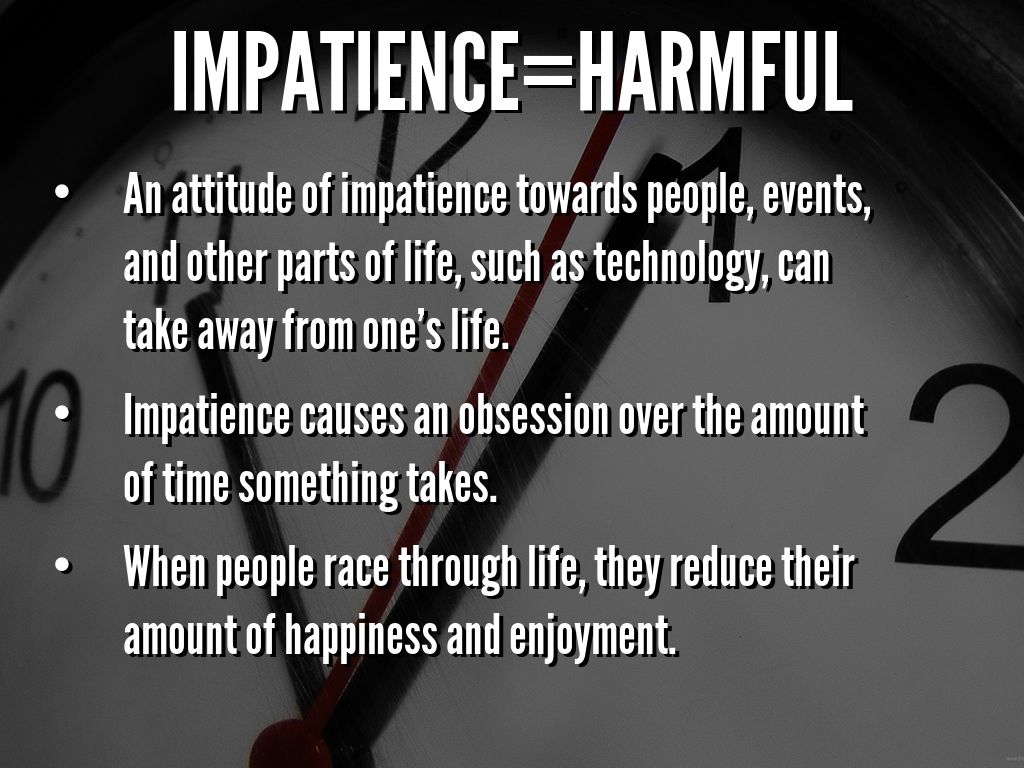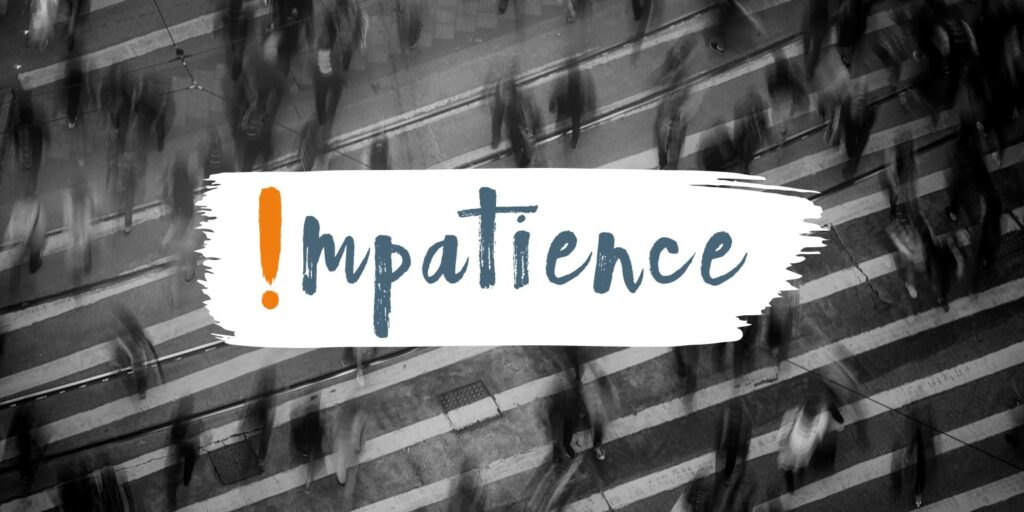Understanding impatience is the first step in tackling it. The word “impatience” comes from a Latin root meaning “to lack patience.” Impatience is a feeling of unease or dissatisfaction when someone has to wait for something they want. Or because their desire isn’t being fulfilled quickly enough. There are many different types and degrees of impatience. But there are also impatience laws governing how we should behave when we feel impatient. In this blog post, we will explore these laws and provide tips on how you can tackle your feelings of impatience.
Contents
Understanding Impatience
What Is Impatience?

Impatience is a feeling of unease or dissatisfaction when someone has to wait for something they want. Or because their desire isn’t being fulfilled quickly enough. It is a feeling of discomfort when someone is unable to do something they want, or experience something they desire. There are many different types and degrees of impatience. But there are also laws governing how we should behave when we feel impatient.
What Causes Impatience?
There are many different causes of impatience.

- Some people may feel impatient because they have a lot of things they want to do and not enough time to do them.
- Others may feel impatient when they are stuck in a situation they don’t want to be in, or when someone is being slow or inefficient.
- Certain situations can cause feelings of impatience, such as when people are waiting for their food in a restaurant, or they’re stuck in traffic.
NOTE: There are many different types and degrees of impatience. But there are also laws governing how we should behave when we feel impatient.
Types of Impatience

Different types of impatience can be categorized according to their cause:
Psychological Impatience
Psychological impatience is caused by a person’s thoughts and emotions. This type of impatience usually occurs when someone is bored and they want to escape from the situation.
Situational Impatience
Situational impatience occurs when someone is in a rush because of their surroundings. Such as being stuck in traffic or waiting for food at a restaurant. This type of impatience can be dangerous, especially if you are driving and trying to maneuver through heavy traffic. It may also make you more likely to become angry and potentially lose your temper.
Interpersonal Impatience
Interpersonal impatience occurs when someone is impatient with other people’s behavior, whether it’s their slowness or inefficiency. In these cases, the person may feel frustrated because they have something else to do and don’t want to wait for another person who is acting slow. This type of impatience can also lead to anger and conflict.
Task Impatience
Task impatience is caused by a person’s desire to complete a task quickly. This type of impatience often leads to frustration when someone feels like they are not making progress. Or they are not completing the task as quickly as they want.
Degrees of Impatience

Based on Patience Level
There are different degrees of impatience, which can be measured by how long the person is willing to wait for something they want.
- Low patience means that a person only has a short amount of time before they become impatient and start to feel frustrated or uneasy.
- Medium patience means that a person is patient enough to wait for some things, but they will start to feel impatient if they have to wait for too long.
- High patience means that a person can wait for things without feeling restless or agitated.
Based on Stages Of Impatience
There are five different levels or degrees of impatience: mild irritation, strong irritation, clinical exasperation, petulant anger, and rage.
Mild Irritation
This is the earliest stage of impatience and is usually characterized by feelings of restlessness or agitation. The person may start to tap their foot or fidget with something to relieve the feeling of impatience.
Strong Irritation
This stage occurs when the person’s frustration begins to increase and they feel more agitated than before. The person might start to pace around or shout at people to release their feelings of anger.
Clinical Exasperation
In this stage, the person’s impatience has become intense and they feel a strong desire for something that can resolve their frustration quickly. To relieve themselves from these feelings, the person might lash out verbally by shouting at other people or criticizing them.
Petulant Anger
This stage occurs when the person’s outward symptoms of impatience are accompanied by an inner feeling of anger that has built up over time. The person will be aware of their feelings and may lash out verbally or physically to release this pent-up rage.
Rage
In the final stage, the person has reached their limit and is completely overwhelmed by feelings of anger. The person might behave violently or destructively that can harm others around them or damage property to release this pent-up rage.
NOTE: While the first three degrees might not cause any harm, the last two can lead to physical or emotional violence.
Signs of Impatience
Many signs can indicate that someone is feeling impatient, such as:

- Fidgeting or squirming in a chair
- Pacing back and forth
- Restlessness or agitation
- Excessive talking and speaking out in frustration when someone is being slow or inefficient with their work
Knowing Impatience Laws
The laws of impatience were first documented in 2003 by two researchers named Piers Steel and Norm Johnston. The laws of impatience are a set of principles that describe the different stages and degrees of impatience.
The Seven Laws Of Impatience

Impatience is not a lack of patience
One of the biggest misconceptions about impatience is that it means a person has no patience. This is not true, as impatience is simply a feeling that is caused by a person’s desire to complete a task quickly.
Impatient people often get labeled as having a lack of patience, but this is not true. Impatience is the result of an emotional response to something that isn’t happening quickly enough or when someone feels like they can do their task more efficiently than another person.
Law of loss aversion
This law is also called the “law of loss aversion.” It means that a person will become impatient when they have something to gain. But it’s going to take more time than expected for them to get there.
For example, you want to play tennis with your friend after work on Friday night and realize that traffic is going to make you late. You start to feel impatient because you want to play tennis. But the traffic is delaying your ability to do so. Traffic congestion is a perfect example of how impatience can be caused by realizing that it will cost more time and effort than expected to reach a goal. In this case, you have a goal to play tennis, and traffic is delaying your ability to achieve it.
In another example, let’s say that someone has a goal in mind but they don’t want to reveal what the goal is. So, they would still feel impatient because there’s something important for them coming up soon and they want it to happen. But they don’t want anyone else to know what it is.
This law can also be applied in cases where people are feeling impatient because they’re waiting for something that they want. For example, you may be feeling impatient while you’re waiting for a new phone to arrive in the mail. In this case, you have a goal to get this phone and it’s taking longer than expected.
Law of precommitment
This law is called the “law of precommitment.” It means that a person will become impatient when they want to reach their goal and there are too many barriers getting in the way. So it’s going to cost them more time or effort than expected.
For example, you have three tasks at work on Friday morning but you can only complete two of them. You feel impatient because you want to get all three tasks done. But the time pressure is going to make it more difficult for you to do so. In this case, completing every task would be a goal that’s worth pursuing and some barriers will prevent you from achieving it (time constraints). Because getting all three tasks done is going to cost you more time and effort than expected. Thus, this law motivates you to try and find a way to reduce the costs of reaching your goal.
Alternatively, this law can also motivate people to switch goals altogether. For example, let’s say that someone has a goal of becoming fit. But they realize that it’s going to cost them more time and effort than they originally thought. In this case, the person may become impatient and decide to switch goals altogether to reach their fitness goal quicker.
Law Of indignation
This law is called the “law of indignation.” It means that a person will become impatient when they feel like their goal has been blocked by someone who doesn’t deserve to block them from getting what they want.
For example, imagine you have two tasks at work on Friday morning but your coworker asks for help with something else. You feel impatient because you want to get your two tasks done, but now you have to help your coworker. In this case, the person who is blocking you from achieving your goal doesn’t deserve to do so (because they’re asking for help with something that’s not their responsibility). As a result, you start to feel impatient and indignant.
This law is also often associated with the “law of precommitment” because when a person feels impatient and indignant. It’s going to motivate them to find a way in which they can reduce the costs of reaching their goal or switch goals altogether (by getting rid of this cause that’s blocking you from achieving your goal).
Law of choice
This law is called the “law of choice.” It means that a person will become impatient when they have to decide which goal or option is worth pursuing. And there are too many barriers involved in reaching any one of those goals.
For example, imagine you’re at dinner with your family and everyone else orders dessert but you don’t want dessert. You feel impatient because you have too many options. And it’s going to cost you time and effort to decide which option is worth pursuing (ordering a meal or ordering the dessert).
This law also applies in cases where there are too many goal choices. But all of those goals can be pursued with relatively similar costs. For example, imagine you want to start a new business but there are too many choices. And it’s going to cost you time and money to research each of those businesses. In this case, you would feel impatient because you have too many options. And all of those options come with relatively similar costs.
As a result, this law motivates people to reduce the costs of making a decision or switch goals altogether.
Law of opportunity costs
This law is called the “law of opportunity costs.” It means that a person will become impatient when they realize that the costs of reaching their goal are going to be higher than expected.
For example, imagine you have three tasks at work on Friday morning but you can only complete two of them. You feel impatient because you want to get all three tasks done, but you realize that completing two of them is going to cost you more time and effort than originally thought.
Alternatively, this law can also motivate people to pursue multiple goals at the same time. For example, let’s say that someone has a goal of becoming fit but they also want to lose weight. They realize that the costs of becoming fit are going to be higher than expected (in terms of time and effort). But they also know that many people can lose weight without being very fit. As a result, this person may become impatient because they want to achieve both goals at once, but realizes it’s not possible.
This law is also often associated with the “law of limited resources”. Because a person feels impatient when they realize that there aren’t enough resources available to achieve their goal (in terms of time and effort).
Law of opportunity
This law is called the “law of opportunity.” It means that a person will become impatient when they realize there’s an opportunity to reach their goal and time is running out.
For example, imagine you want to lose weight because your wedding is in three months but it doesn’t seem like anything has changed yet (in terms of your weight). You feel impatient because you realize that there’s an opportunity to reach your goal and time is running out.
Alternatively, this law can also motivate people to take risks. For example, let’s say that someone has a goal of becoming wealthy but they don’t want to take any risks. They may become impatient because they realize that there’s an opportunity to reach their goal but they’re not taking any risks.
As a result, this law motivates people to take risks or pursue multiple goals at the same time.
NOTE: Impatience laws are important to understand because they can help us to tackle our impatience. However, it’s also important to remember that these laws are not always accurate and we should use them as guidelines rather than rules.
Tackling Impatience

Now that we have a better understanding of what impatience is, let’s look at some tips and strategies for tackling it.
Tips for Dealing with Mild Irritation
- Sip a drink slowly
- Massage your forehead or temples with gentle strokes.
- Distract yourself by thinking about other things, listening to music, etc.
Tips for Dealing with Strong Irritation
- Take deep breaths and count to ten in your mind before reacting.
- Consider the situation from another person’s perspective.
- Remove yourself from the situation if you can’t control your anger.
- Talk to someone about how you’re feeling or write in a journal.
Tips for Dealing with Clinical Exasperation
- Try to identify what is causing your frustration and see if there is anything you can do to resolve it.
- Take a break from the situation or walk away for a few minutes.
- Talk to someone about how you’re feeling or write in a journal.
Tips for Dealing with Petulant Anger
- Identify what is making you angry and why it’s bothering you so much.
- Try to distance yourself from the person or thing that’s angering you.
- Talk to someone about how you’re feeling or write in a journal.
Tips for Dealing with Rage
- Seek professional help if your feelings of anger are becoming overwhelming or destructive.
- Identify what is making you angry and why it’s bothering you so much.
- Try to distance yourself from the person or thing that’s angering you.
Talking To a Professional
If you’re finding it difficult to manage your feelings of impatience or anger, talking to a professional can be very helpful. Many different types of therapists can help you deal with your emotions, including:
- Cognitive-Behavioral Therapist
- Psychoanalyst
- Interpersonal Therapist
- Family Therapist
While it might not be easy to control your emotions, learning how to deal with them positively can help you lead a more fulfilling and happier life. According to experts, impatience is an uncontrollable character flaw or personality trait that someone has no choice but to live with for the rest of their lives. However, this is not the case. We can manage impatience and even overcome it with the right tools and strategies. So don’t give up if you feel like impatience is ruling your life – there is hope!
Professionals’ On Trait Of Impatience

“Impatience is a trait that can be seen in many people. It is often characterized by a feeling of wanting to get something done as quickly as possible, and can sometimes lead to irritability or frustration. While impatience can be frustrating for both the person experiencing it and those around them, there are ways to manage it.” – cognitive-behavioral therapist
“Impatience can be a very destructive emotion. It can lead to anger, rage, and even violence. If you find that you are experiencing these extreme emotions more often than not, it is important to seek professional help.” – psychoanalyst
“Impatience is often caused by a feeling of being rushed. However, it is more about a feeling of being pressed for time than actually having to be somewhere.” – interpersonal therapist
“Impatience can result from several different factors. Some people are just genetically predisposed to being impatient and cannot do anything about it except learning how to deal with their feelings in the best way possible. Others are impatient due to their circumstances like stress or anxiety.” – family therapist
“Impatience is not always a character flaw. Instead, it can be seen as an indication of some other problem that needs attention, such as difficulty managing feelings of anger, fear, and insecurity.” – psychiatrist
Conclusion
Impatience laws are important to understand because they can help us to tackle our impatience. However, it’s also important to remember that these laws are not always accurate and we should use them as guidelines rather than rules.
Tackling impatience is not easy but with the right tools and strategies, it is possible. Remember to stay positive, patient, and persistent and you will eventually overcome your impatience.
A Word From Mantra Care
Your mental health — your psychological, emotional, and social well-being — has an impact on every aspect of your life. Positive mental health essentially allows you to effectively deal with life’s everyday challenges.
At Mantra Care, we have a team of therapists who provide affordable online therapy to assist you with issues such as depression, anxiety, stress, relationship, OCD, LGBTQ, and PTSD. You can take our mental health test. You can also book a free therapy or download our free Android or iOS app.


